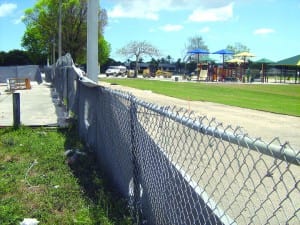
That’s good news for more than 300 youngsters participating in Optimist baseball who were forced to use other ball fields for their winter season.
“Weather permitting, new sod and pavers are slated for installation within two to three weeks,” said Laura Phillips, spokesperson for Miami-Dade Department of Parks, Recreation and Open Spaces. Quality Construction Performance Inc., contractors, used approximately 62,000 square yards of fill to replace soil removed to a depth of one foot in contaminated areas.
The 338-day project, which suspended activity at three baseball fields for Optimist athletic programs, has continued to close areas at Colonial Drive Park, 10750 SW 156 Terr., and Chapman Field Park, 13601 Deering Bay Dr.
While certain areas of Hammocks Community Park remained usable, the Hammocks Optimist Club had to relocate its four-sport winter program, which serves more than 500 youngsters, to Devon Aire Park, 10411 SW 122 Ave.
The Optimist summer session for 2015 is now headlined on its website to open June 13 at the Hammocks fields. Registration, however, will take place at Devon Aire starting on Saturday, May 2, from 10 a.m. to 3 p.m., for youths ages 6-14 at fees of $100 per player.
“We’re looking forward to returning to the Hammocks which has been the home for our baseball program since 1987,” said Mike Partado, president and longtime board member for the Optimist sports programs.
During the fall season at Devon Aire and McMillan Parks, the program served 325 youngsters in baseball and 175 in football as well as several hundred in soccer and cheerleading.
“The county hoped to reopen Hammocks by January of this year, but some delays occurred and we scheduled the winter program at Devon Aire,” Partado said, noting that additional improvements, including lighting fixtures, were added as improvements during the decontamination.
Source of contamination at the three parks commonly used by Kendall residents remains “undetermined.”
Built in 1986, the 15-acre park in the Hammocks was among the first of 112 county parks to be tested for potential contamination. Seven parks in the City of Miami also were found to have some contaminated areas requiring remediation.






